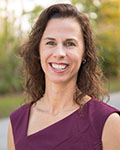2016
Melodie H. Eichbauer
- Assistant Professor
- Florida Gulf Coast University

Abstract
Codes, Communities, and Church examines changes and continuities in the expression, study, and implementation of law in western Europe between ca. 600 and 1300. The collaboration brings together historians Abigail Firey, a specialist in early medieval law, and Melodie Eichbauer, a specialist in later medieval law, to show how over time medieval communities—such as monasteries, university faculties, networks of bishops, and royal courts—adapted existing law to suit their interests and needs, and how the influence of the church shifted some of the conceptual frameworks of secular law. In addition to investigating the production and application of law in various communities, the project also explores the changing environments and techniques for teaching law. By analyzing both production and teaching, this project develops a richer contextualization of legal texts that enjoyed extended use, and traces earlier legal traditions in subsequent social configurations, debates, and political maneuvers. The analysis of the historical evolution of legal knowledge and practice is anchored in close study of texts such as early ninth-century treatises on procedure, twelfth-century commentaries on canon law, and thirteenth-century interpretations of Roman law. The project will result in a coauthored monograph and an open-access website displaying annotated images of medieval legal manuscripts discussed in the book. The website is designed for those interested in legal history, but who perhaps lack the paleographic and codicological background needed to work with such material: the site’s annotations introduce manuscript representations, scribal abbreviations, and textual range of medieval law for different periods. Although the project presents texts such as the Visigothic Code and the laws of Frederick Barbarossa, Codes, Communities, and Church argues that law is not simply issued by governmental authorities, but is generated and given meaning by the communities that dynamically find, select, circulate, adapt, and create law suited to their more particular needs and practices. The project thus shows how legal texts can be used as witnesses to varied political and social perspectives, and to the promotion of those perspectives through the rhetoric of legislation and jurisprudence. Award period: August 1, 2016 through July 31, 2018

